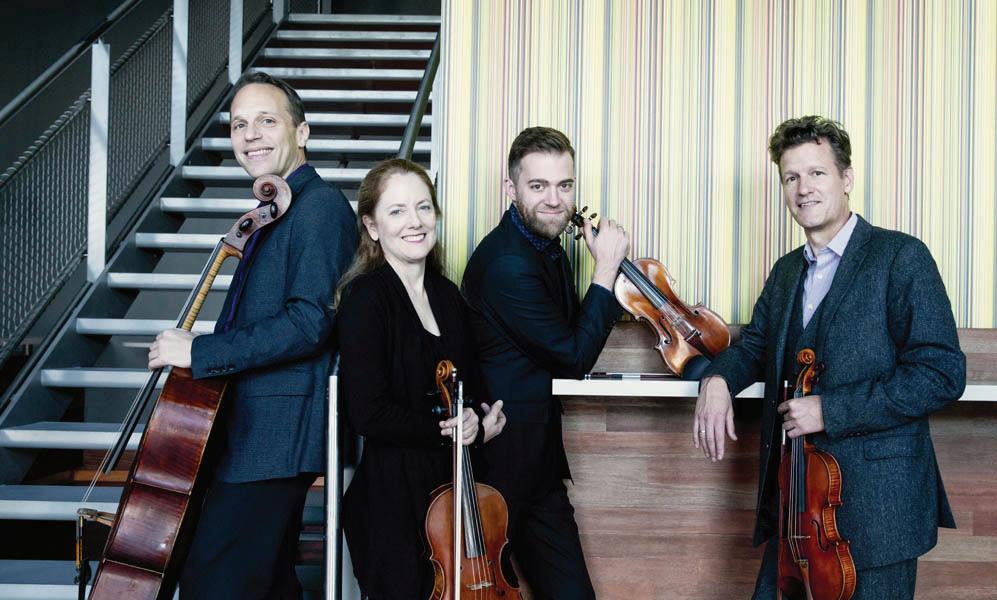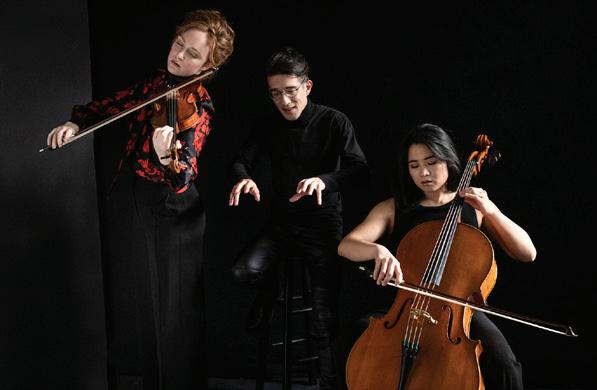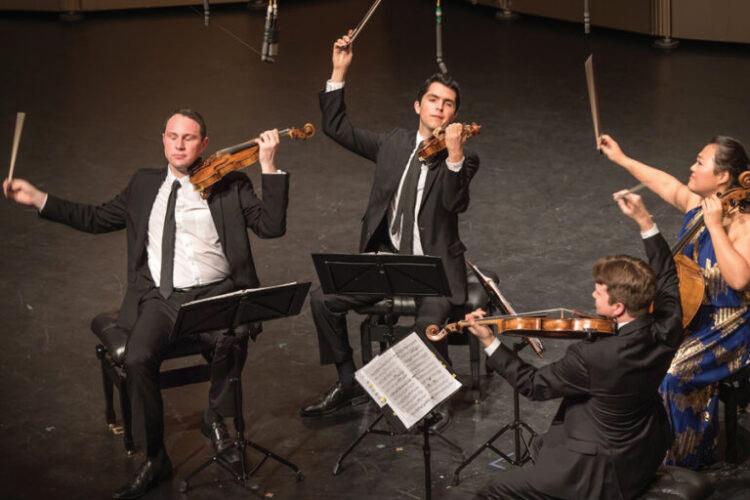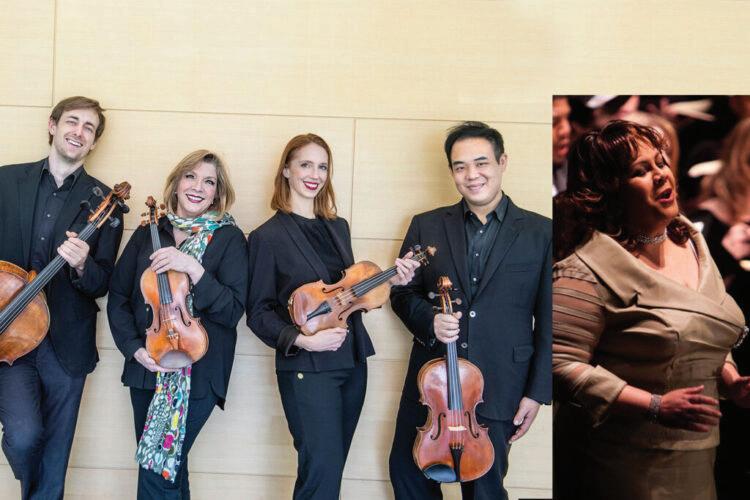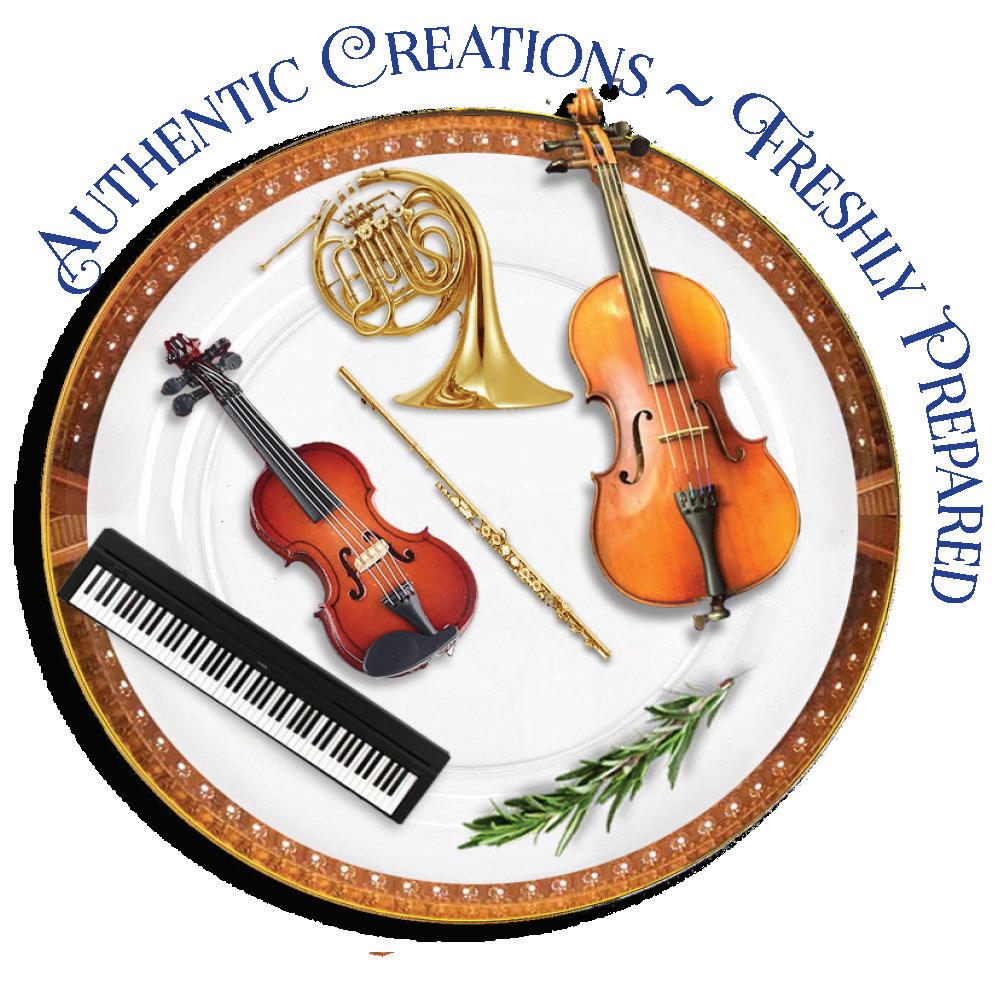Reflections






“In the long run, any words about music are less important than the music.” Dmitri Shostakovich
Fortunately, in the case of composers, we can learn about them through their music and words.
For this special season, to celebrate our composers, we’ve created this book to provide a personal and intimate look into the creative energy and inspiration that spur our seven commissioned composers to new heights in the ever- changing world of chamber music. In other words, a chance to spend a few delightful minutes reflecting with each of our talented composers.
For the interviews with each composer, we enlisted the writing skills and musical insights of noted author, Sam Jacobson. Sam is a software engineer with a musicology degree, currently in Cleveland after having previously spent several years in Chicago.
He has critiqued world-class ensembles and major orchestras of Cleveland, Philadelphia, Chicago and many others, and recently authored a wonderful review in BachTrack of Sergei Babayan’s concert in October 2021 as part of Chamber Music Columbus’s 74th season concert at the Southern Theatre. In addition to writing for BachTrack , he also maintains a blog which can be read at Quasifaust.wordpress.com
We’ve also included an insight into a composer of words of another sort. Our 75th anniversary poet laureate - Jennifer Hambrick.
Since our founding 75 years ago, by 17-year-old, James N. Cain, we at Chamber Music Columbus have been most fortunate to have the support of devoted and generous guarantors, contributors, sustaining members and patrons. These are supporters who passionately believe in our mission so succinctly stated by our founder, “promoting the advancement of and appreciation of its members and the general public of the State of Ohio.”
As we mark our 75th year of presenting musical excellence, we are indebted to all who have offered their support, but most particularly those whose beneficence provided the means to commission the composers featured herein.

If, as Amy Beach profoundly stated, “Music is the superlative expression of life experience,” We today, are the beneficiaries of many, many glorious lives.
Katherine Borst Jones, President Taylor Hallowell, 75th Anniversary Committee ChairThis book is also available in eBook format at chambermusiccolumbus.org/library/reflections. ©Chamber Music Columbus. All rights reserved
As we celebrate our 75th season, we are committed more than ever to our mission of enriching the cultural life of central Ohio through the love and celebration of chamber music. We continue to fulfill this mission by inspiring the community through the presentation of renowned chamber music ensembles from around the world and by engaging the community through educational programming that promotes chamber music as an art form.
Our concerts are presented in the world-class setting of the historic Southern Theater. The Southern’s national reputation for amenities and acoustics makes it a favored destination for artists as well as music lovers. That reputation has been enhanced by their untiring efforts to make sure that the Southern provides a safe and healthful environment.
We also seek to grow the audience for chamber music by attracting and educating the public and by directly engaging budding young musicians through our scholarships and educational programs with exceptional visiting artists.
Confident in the belief that even the best are better together, we continue to collaborate with other local and regional arts organizations for the benefit of all and contribute to an unrivaled impact on our diverse and talented community.
That we have come this far is a testament to the generations of chamber music lovers who continue to support us. As you browse our website, we hope that you, like so many before, will be inspired to enjoy our concerts and support us.
Contact Us Chamber Music Columbus PO Box 14445 Columbus, Ohio 43214 info@cmcolumbus.org ChamberMusicColumbus.org (614) 267-2267 TICKET SALES OFFICE: 614-469-0939
Composer Jaehyuck Choi was sponsored by The Ohio State University College of Arts and Sciences for a composition to be performed by VIVO.
Composer Ching-chu Hu was sponsored by Dr. Richard & Yvonne Heather Burry to compose a 75th anniversary theme to be arranged for each concert and for an opening performance by the American Brass Quintet.
Composer Libby Larsen was co-commissioned by Schubert Club of Minneapolis and Chamber Music Columbus for a composition to be performed by Bridget Kibbey and Alexi Kenney with sponsorship provided by Dan Jensen to celebrate the 75th anniversary of Chamber Music Columbus and the 140th anniversary of the Schubert Club of Minneapolis.
Composer Mark Lomax II was sponsored by the Peeler Family for a composition to be performed by the Cavani String Quartet and Louise Toppin, soprano.
Composer Korine Fujiwara was sponsored by Carole Wilhelm in memory of Robert G. Wilhelm Jr. for a composition to be performed by the St. Lawrence String Quartet.
Composer Huw Watkins was co-commissioned by Wigmore Hall and Chamber Music Columbus with sponsorship provided by Charles and Betsy Warner for a composition to be performed by the Calidore String Quartet.
Composer Karim Al-Zand was co-commissioned by Chamber Music Columbus and Chamber Music Houston for a composition to be performed by the Merz Trio.
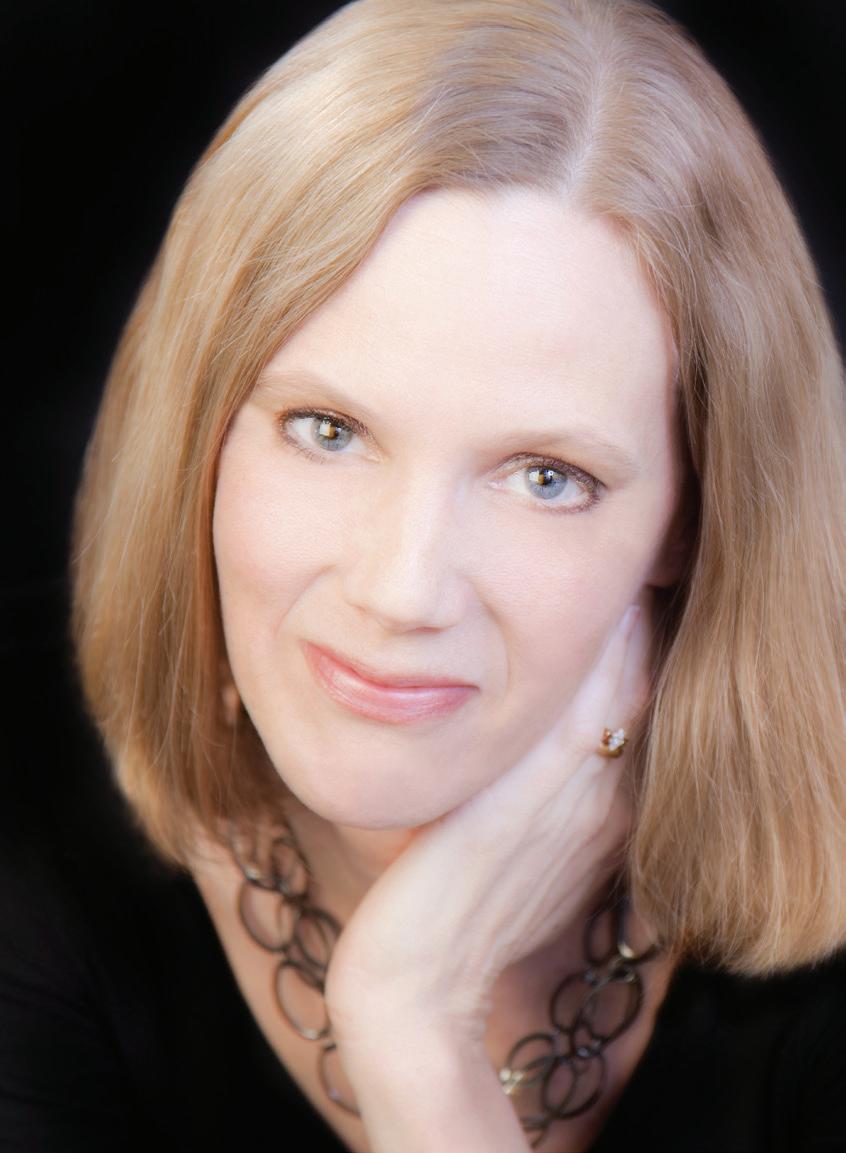
A poet hailed for her “brilliant” imagery, “masterful” craftsmanship, and “uniquely” musical voice has been engaged to serve as poet laureate for the 75th anniversary season (2022-23) of the world-class Chamber Music Columbus concert series.
“It is an enormous honor to have been invited to write and present a series of poems as poet laureate of the 75th anniversary season of Chamber Music Columbus. I am hugely grateful to Katherine Borst Jones, board president of Chamber Music Columbus, for extending this special commission to me on behalf of Chamber Music Columbus, and for giving me free rein to unleash my musical and poetic gifts in celebration of this milestone in the history of this special organization.” said Hambrick.
As poet laureate of Chamber Music Columbus’ 75th anniversary season, she has written a series of seven poems, one for each of the 2022-23 season’s seven concerts. The poems unite conceptually around the idea of the elements, or raw materials, of chamber music –wood, metal, air, hands, beginnings and endings, time, and space: the wood and metal of musical instruments, the air essential to singing and playing wind instruments (and to life itself), the hands that draw bows across strings or press keys and valves, how music emerges from and returns to untold depths within us, the time in which music and our experiences of it unfold, and the physical space in which every note played or sung finds an acoustical home that enables this special type of music to resonate (literally and figuratively) among us.
These musical elements serve as guiding metaphors in her poems. As such, each element acts as a bridge connecting our experiences with music to our experiences in other aspects of the world around us. Hambrick is a four-time Pushcart Prize and Best of the Net nominee. Jennifer Hambrick is the author of the poetry collections In the High Weeds, winner of the Stevens Manuscript Award of the National Federation of State Poetry Societies; Joyride (Red Moon Press), currently shortlisted for The Touchstone Distinguished Books Award from The Haiku Foundation; and Unscathed (Night Ballet Press).
She was featured by former U.S. Poet Laureate Ted Kooser in American Life in Poetry; was appointed the inaugural Artist-inResidence at historic Bryn Du Mansion, Granville; and has received numerous awards and prizes, including the Sheila-Na-Gig Press Poetry Prize (2020), First Prize in the Haiku Society of America’s Haibun Award Competition (2018), First Prize in the 2021 Martin Lucas Haiku Award Competition (U.K.), and many others.
Hambrick is a frequent recipient of poetry commissions, and hundreds of her poems appear in literary journals and invited anthologies around the world. A classical musician, public radio broadcaster, and web producer, she lives in Columbus. Visit www.
“It is my hope,” said Hambrick, “that these poems will lift us together ever higher into the shimmering galaxy of chamber music, that they will open our ears to the hidden melodies of life around us, and that they will inspire us to listen for the hum of humanity within each other, to hear the music that connects us all.”Photo: Barb Schwartz
I first remember composing as an assignment for my piano teacher when I was four or five, essentially just writing a melody over an Alberti bass. In high school, Samuel Adler came and wrote a piece for our choir and orchestra called A Prayer for Peace. And that was one of the pivotal moments because it opened me up to contemporary music. At the time, as a pianist, I was mainly playing very classical and traditional repertoire, and to hear some of these other sounds inspired me to start writing more pieces that would allow me to be a bit more free.
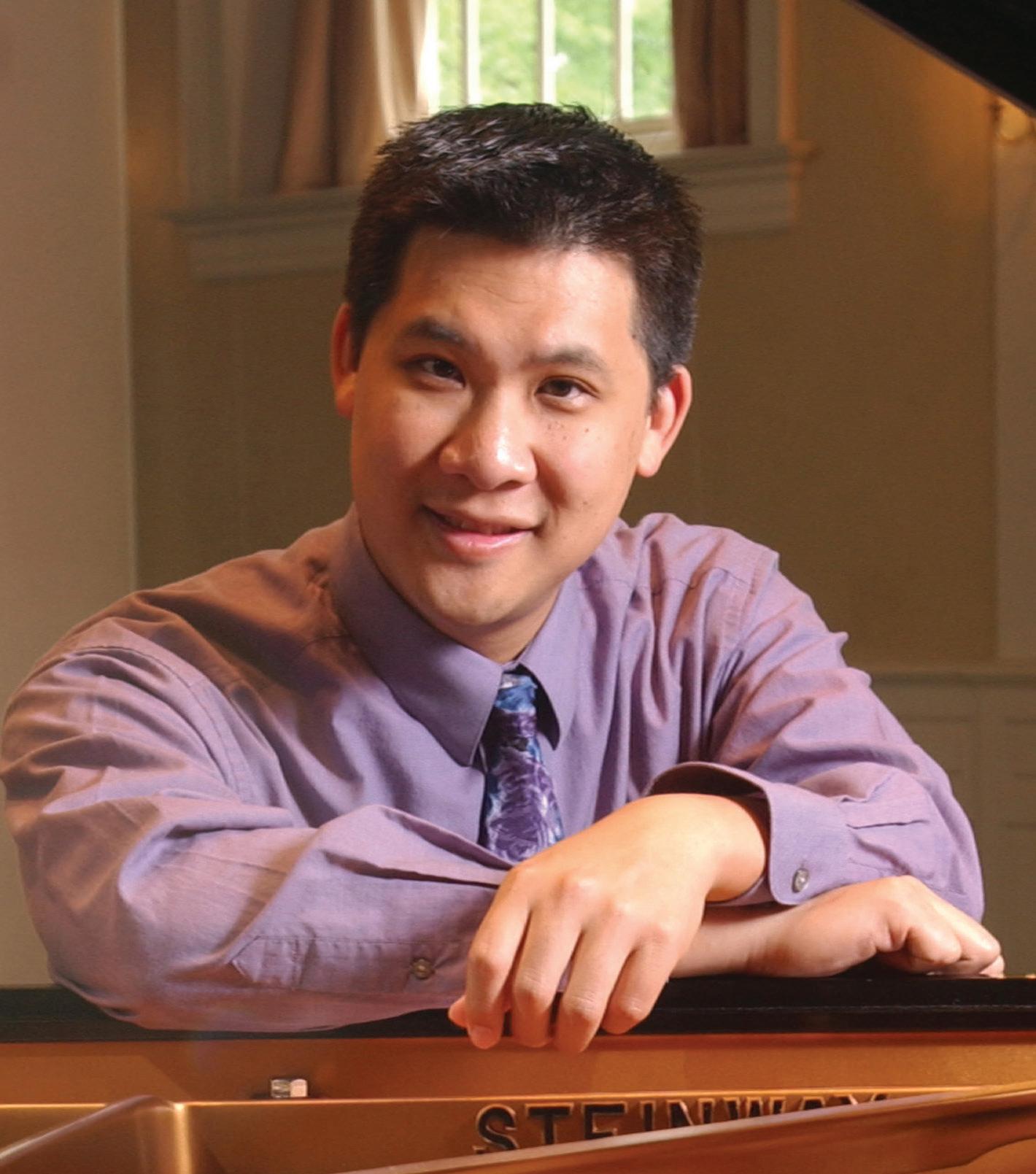
I spent the summer before senior year of high school at Tanglewood in the young composers program. Leonard Bernstein had just conducted and my friends encouraged me to go up to him and show him my music. So we dutifully stood in the autograph line, and I said to him, “Mr. Bernstein, I know you’re very busy, but is there a way to show you some of my music?” He told me that the next day he’s having some composition fellows over, and invited me to join and bring my music! That night, I remember coming to the house and he came out and gave a big hug, and he remembered my name which blew me away. He went through different people’s pieces, and at the end, asked me if I had something to show. So I showed a flute and piano piece that I had written at the time. They looked at my piece and said “I like what you did here” or, “have you thought about doing this?”
Even at that time, I don’t think I knew that I was going to become a composer, but I knew that this was an experience that I really had to treasure. I think it just sort of happened in terms of being a composer. I studied music because it’s what I loved to do, and I’m a composer now because it’s what I love to do.
I draw inspiration from a lot of different things. Especially during the last few years, there’s been so many different issues that have been brought up to the forefront, that as composers, as creative types, as my friends who are writers, visual artists, or theatre makers, it seems like we all crave the space to find a way to make commentary, or a way to make sense of a situation, whether that is a social situation, an environmental situation, a political one, or a personal one. For me, music is what I use to unravel thoughts or untie the knots that are in my head over some of these issues, and to make sense out of some of them.
Sometimes it’s very personal – and it’s something where I may or may not choose to share that in program notes with the audience. But even if I don’t share, the meaning of it, or the spirit of that piece, may still go through so that audience members or performers can connect with it even without knowing the whole truth behind the situation. I think music is such a powerful language and we all use it in different ways, whether it’s to reminisce about something in our past, to celebrate, to psych ourselves up, or to help us grieve and soothe. I think the arts are so important in that way. And I feel like music is my way of providing commentary without words.
What’s really interesting about the process of writing for me is it’s almost like a roller coaster. Sometimes when I first get started, and I’m trying to find the materials, trying to find what this piece is about, and the rules or parameters that I’m setting out for myself, is sort of like going up the roller coaster. You know that something good – or you’re hoping that something good – will happen. But you’re waiting for that moment. And then when I get into that zone, it is sort of like the downhill where things are coming, things are making sense, and I just need time to let that run happen. Of course, deadlines can sometimes force the roller coaster to go a little faster! But when I do get into that compositional zone, it’s a nice space to be in creatively, because it just allows you to do work, and things like the musical decisions seem to make sense, and it seems to come together quite easily.
I think those who know my music will say that it’s lyrical. There are motives and ideas that one can grab on to and hold on to. I’m a fairly tonal composer, but also, there’s aspects of my music that show my identity as an Asian-American man. I grew up in the United States, but in a Chinese household where I was speaking Chinese. And the music that was around me that my parents would play was a combination of Chinese folk song, Chinese opera, and Western symphonies. Some of those influences come through, depending on the piece and depending on what the piece is for.
The development of my music is very organic, and my hope is that it proceeds and goes in a direction that makes sense because the music drove it that way. The music itself should decide where it goes as opposed to strictly following a rule. Beyond that, one would hear things in my music that are pseudo-diatonic, a little bit neo-romantic – but not that thick in terms of the textures – and maybe some Asian influences. If an audience is coming into a concert and they don’t know my music at all, I hope that they’ll be open to simply hearing the sounds and finding something they can connect to.
For audience members wanting to explore your music, which works would you point them to?
One of the pieces I would like people to hear is Spheres of Influence. It’s for string sextet, but it’s also been done for string orchestra, and as a septet adding a bass. It’s a work that’s very personal. It speaks to the idea of our spheres of influence, meaning those that have influenced us. I started thinking about the teachers that we studied with, who they studied with, and the master teachers that they’ve studied from, and how that lineage comes down to us. And we’ve learned a little bit based on all of that generational knowledge, but it’s the same thing with parents, what we learn from our parents or from our friends: they are big influences on us and the decisions that we make. Looking at that, I realized that we also are influencers in the sense of if we’re a teacher, how do we teach our students? Or if we’re a parent, how do we parent and what do we pass along to our kids? Or as friends, how does what we say impact others?
Another work that I hold very close and would direct listeners to is Snow Ash, for violin and piano. It’s piece that I wrote while a fellow at Banff. I was thinking about the environment there and the mining that was done and how they were destroying mountains. I was there back in 2003 when there were all those forest fires. There were days where we literally could not see a thing because of all the smoke and ash. And there were times we would walk out and it really was snowing ash. It just such a made such an impression. And this work is a delicate piece about being in that moment of vulnerability.
In addition to music, your Dennison faculty profile lists affiliations with the departments of East Asian Studies and Queer Studies. How do your cross-disciplinary research interests influence you as a composer?
It all ends up dealing with identity so that students have a way of understanding who I am based on my interests and those intersections that happen. One of the aspects of my position at Denison that I’m most proud of is founding the Tutti Festival in 2004. It started out as a new music festival, but I called it Tutti because I always thought it could grow to include everybody. We’re having our tenth festival this year, and over the last ten iterations, it has involved many different departments across campus. Whether it’s modern languages, or English, or studio art, or theater, or dance, or even athletics, we’re finding connections to talk about art, and present art or new works that are touching on that. For me, all of these together is who I am, and my fingerprint. And so the music and the work that I do impacts, or is a commentary, on those issues.
What does it take to become a composer? And what makes for a good composer?
I think what makes for a good composer is authenticity. Regardless of the genre, regardless of your age, if you’re writing music that you will defend, if you truly believe in what you’re saying and it is in your voice, then I think you will find that path and that success. There are pieces that I perhaps didn’t think worked well – so even if the audience, critics, or players liked it, it wouldn’t matter, because I wasn’t satisfied with that piece. But if I totally believe in a piece, it wouldn’t hurt me if the audience didn’t like it, because I know it works and is authentic.
When working with students, what’s very important is that they develop their own voice. I want to make sure that if they study with me, they get the tools and skills to reflect on their work and process what they’re doing. But it’s always been important to me for students to retain their fingerprints, so that if you heard ten works by students of mine, you could match them up to the people if you know them, because their fingerprints are different so their music will be different. Ultimately, the whole goal is to have them find their authentic voice.
Snow Ash
InterviewbySamJacobson
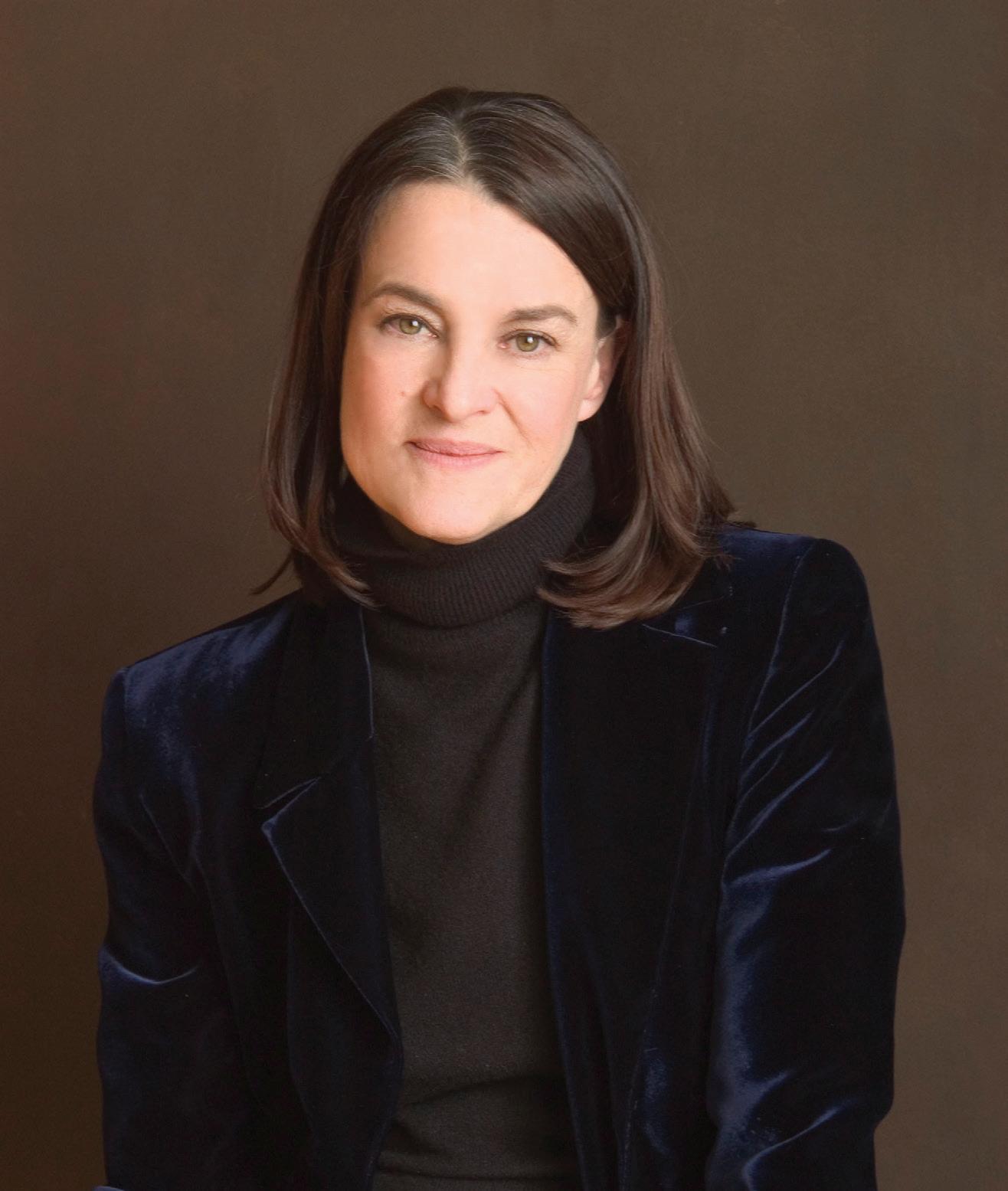
I express myself and my being best through writing music – through making shapes of sound which we call music. As a child, I was very talkative and very expressive. I attended a Catholic school and they taught all the children to read and write music as a daily discipline, as a daily sequential development of the human brain. So I learned that I could write down thoughts in my head in words, music, or math. And I could put them on paper and not get put in the corner for talking too much – I could literally be quiet while being quite communicative.
So a combination of being a really ebullient, very communicative child, and going to a school where I learned how to write music is at the heart of it. By the time I went to high school, I was already writing a lot of music. Not to show to anybody, but to express what it was like to be alive. It has really been a natural outlet my entire life, but with a rigorous study attached to it.
That really underscores the value of a good music education from a young age. Do you think you would have taken a different trajectory if
I absolutely would have taken a different trajectory. I don’t know what that is, because I haven’t lived that other trajectory. But I do know that I had what I consider to be an extraordinary music education, because it was integrated. It wasn’t defined as anything other than what we were studying: it was simply integrated into the study of all things. I was lucky enough to be in school at that time with that particular teaching order of nun, and they were determined to help us to develop our brains, and cultivate an educated mind in what would now be called a
You have a vast catalogue of compositions – over 500 to date. For someone new to your music, how would you orient them? What works would you point them to that you are most proud of or most authentically capture your voice?
My voice is changing post-pandemic, so I’m hesitating. But I would say Water Music, which is my first symphony, written in the early 1980s, would be a nice way to understand the joy that I have, and also my connection to the natural world. And I write a lot of art song. Coming from a Catholic school tradition, I’m very interested in history and there is a song cycle called TryMe,GoodKing where I set words of five of the six wives of Henry VIII.
The piece that I’m composing for Chamber Music Columbus is for harp and violin, so I want to send people to a work includes the harp. One is the Trio in Four Movements which I wrote for Kathy Jones’s trio, and am very proud of that piece. Another piece that includes harp is called \, and it’s for harp and treble voice chorus. It was inspired by the paper cuttings of Hans Christian Andersen. I am working very hard to put as much of my music and fine performances on my website as possible.
One thing I noticed on your website that really fascinated me is that you have your works arranged by theme. Have you found there to be common themes you keep revisiting over the years?
Yes, I have. One of them is the natural world, and how our human energy as a species can interact with non-human physicality. And that’s a theme I’ve been trying to express for over forty years through various pieces. Another one is mysticism and the soul. Not religion, but mysticism. Energy is another theme. In my own work, before I even know what the notes and the rhythms are, the first thing I connect with is the energy that I want to express through the music. And in many of my works, you’ll find multiple themes, for example, energy and the natural world, or text and music and energy. It’s a way of trying to explore music through more abstract themes. In organizing my website that way, my hope is that people might take a work like Water Music and be able to explore what themes really informed the piece.
How would you describe your musical sound and style? If I had some music playing on shuffle and it landed on one of your works, what would cue me in that this was a Libby Larsen piece?
First of all, you would probably hear music performed on traditional orchestral instruments as opposed to a mix of electronics – you’ll hear my love for acoustic instruments. Beyond that, I’ve been told by many people that they know it’s my music because of a certain kind of energy. That puzzles me, because there’s no way to notate energy – all we have is rhythm, tempo, and dynamics, which are really just abstract
suggestions. If someone gets to a string quartet, for instance, it’s through the energy that they know it’s me and not Mozart or Stravinsky or Philip Glass.
The other thing that I’m often told is that my music is not tonal, but it is tonal. In other words, you still can feel grounded in a tonality. I build the architecture of my pieces based in a ground tonality. And the macrostructures of my pieces, the architecture, takes into consideration the natural physics of how tones relate to each other in space. So it doesn’t sound like Bach, it’s not functional keyboard harmony: it’s my own approach to staying grounded in the infinity or tone which is in the air.
Earlier in our conversation you mentioned that your musical voice has shifted in the wake of the pandemic. Can you share more about the new direction it has taken?
All of us have been given the opportunity to spend time with ourselves. And there’s grace around that. No one is tapping their fingers, saying there’s a deadline. In the pandemic, there are no deadlines. I feel like because we’ve all been floating around without deadlines and without the structures of control, what’s coming through to me in the way that I bring music out into the air, is a deeper and more trusting relationship with my own sense of timing. For the first year of the pandemic, I had no idea what time was about!
What’s happened and happening is that the way the sound flows out is less connected to artificial constructs, like tempo or meter. It doesn’t really have double bars. I am not heading for the last page. The artificiality of the parameters of music have been set aside at the place where the music happens. All the artificial things we’ve imposed culturally on music – which can be very useful – I don’t need in quite the way I did before. I don’t want to scare people – we need those devices to organize our brain as we’re hearing something that’s zipping by in micromoments. But at the place where the music starts, where the image starts arising – that’s much stronger now.
For Chamber Music Columbus, you’re writing a duo for harp and violin. That’s an interesting combination without many examples in the repertoire. What’s been appealing or perhaps challenging about that instrumentation?
I have not written for this particular combination before, and it’s so exciting. The moment the sound starts on a harp is when the finger plucks, but it’s really not the pluck. It’s the sound that emanates right after the pluck. That pluck excites the air and excites the mind and the imagination. If you pluck pizzicato on a violin, that doesn’t excite the air in the way a harp does, it just suggests a moment of pitch and duration. But once you begin to bow the violin, then the instrument has evolved to excite the air in such a way that it’s almost pure legato, whereas the harp is not pure legato. So, there are many things about the two instruments together that suggest they are contrary to each other. I’m really excited to understand how I can use the instruments themselves to their best advantage to create the shape.
When working on a new piece, what sort of communication do you like to have with the intended performers, and how collaborative is the process?
Bridget Kibbey and I have had a really good conversation, and we sussed out why we respect each other’s work. She’s a stunning musician. I first heard her play at a Schubert Club concert in Saint Paul, Minnesota, and I had never heard anything like that coming from a harp.
Where I find I really love to collaborate is in rehearsal. Once I’ve got it as best I can on paper, when we get in the rehearsal space together is the most fun I can possibly have, and then the piece starts to come alive. All our energy gets infused into the suggestions that are on the page. The rehearsal room is where the raw collaboration happens, and there I truly love to let go of the page and let the music live.
How do you measure success as a composer? How do you determine if a composition accomplished what you intended it to? There are a couple areas where I try to measure success. Have I taken the idea for the piece and lived with it enough so that I’ve transcended my own technique? If the piece itself has transcended anything my brain could think of, passes over my control and starts to show me things, that’s a measure of success. I never want to know everything about a piece of music that I compose. The other area of success for me is when the performers not only own the piece, but are excited by working on the piece. Something that came through me is now coming through the performers, and that’s the circle for me.
Being given an opportunity to create a new piece of music is an extraordinary thing. For any opportunity I’ve had to create music with somebody asking for it is a real act of faith. It’s an extraordinarily generous process that music offers us to be together. And I am so grateful for it.
SymphonyNo.1(“WaterMusic”)
TryMe,GoodKing
Trio in Four Movements
The Ballerina and the Clown
InterviewbySamJacobson
Sat. Jan 28, 2023 - 4PM
What experiences shaped your musical development and influenced you to become a composer? In particular, did you have any formative musical experiences growing up here in Columbus?
I was born in Blacksburg, Virginia where my parents taught at Virginia Tech. My mother started the gospel choir there, and my father was the chaplain – my first experiences with music came from that. We moved here to Columbus when I was two. And I started playing in church at age six as a drummer. Growing up in the Black church, you’re always around music, and because my mother was a choir director and children’s gospel music composer, music was just the environment that I grew up in. By twelve I was playing professionally, and started to get interested in Black improvised art music – otherwise known as jazz.
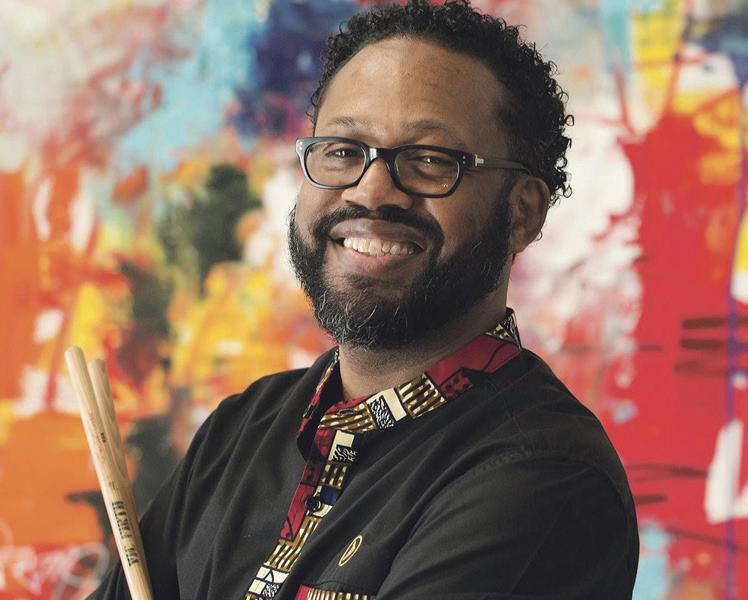
There was a local musician by the name of James Elliott who I met at Centenary United Methodist Church, and he convinced my Christian conservative mother to allow me to go to Jazz and Eggs, a Saturday morning jam session at the Marble Gang on Mt. Vernon. So that’s how I learned improvised music. And from there, it kind of took off: I started playing gigs around age 14, and by 15, was in the high school band and playing with folks like Wynton Marsalis. In Columbus at that time the music scene was amazing and very fertile for young, precocious musicians. I could play every night of the week, any kind of music I wanted. So I literally played everything from country folk and Tex-Mex, to rock and roll, and the gospel to jazz, classical, anything I wanted to play, I could play.
And I got to hang out around a lot of composers of all kinds of music. There was Dr. Raymond Wise, one of the country’s foremost gospel composers, and Big Band arranger Vaughn Wiester – he had thousands of scores of classical and jazz in his library that we could borrow (as long as we didn’t mark them up!). And there were so many other cats around that were either writing their own music or doing original arrangements of existing works. At Fort Hayes High School, we were forced to create our own material. We couldn’t play anything off the record or out of the book as it was written – we were taught how to perform work that we put our own stamp on. Between all of those elements, I started composing in high school, and had enough material that I felt confident in making a record, and start recording when I was 18 or 19 years old, and we put it out when I was 20. That was 1999, and since then, I’ve done over forty records of mostly original material.
Improvisation is a key element of much of your work. How does one learn how to improvise, and what makes for a good improvisation? What makes one a good improviser is the same thing that makes one a good conversationalist. You have to learn words, you have to have a vocabulary, syntax, grammar, and you have to understand how to form a thought and communicate it well with the language. Music is the same, it’s an amalgam of sound, just pure sound as it relates to expression. On pianos and guitars and drums, you have to develop your own voice for expression. And then you learn the rudiments of the musical language in which you’re most resonating with in terms of expression.
It’s the communicative power of the musical statement that makes a good improvisation. A lot of people can get up there and be fancy and run their scales up and down the instrument, but there’s no emotional content, and no narrative arc to the structure of the improvisation. So for me, a good improviser is a person who knows how to tell stories through sound. Some people are just naturally better storytellers than others, so you look for those people who are special storytellers and you try to model yourself after them.
How might you characterize your musical language and style? What do you hope listeners pick up from your works?
It depends on the ensemble, but at the heart of it, whether I’m using improvisation or not, I seek to tell a story in each composition. In fact, it’s hard for me to compose if I don’t have some kind of narrative arc in mind. In my head, it’s almost like a movie montage, and I’m scoring a film in my head, and I can see the characters engaging each other. You hear syncopation, you hear blues vernacular, you hear colors, and you hear texture with the instruments – and hopefully a conversation if there’s more than one. And expressiveness: I want to elicit an emotional response from the listener, whether it’s the climax of the piece or a general mood, so hopefully there’s some affect for both the listener and the performer.
Your work draws on traditions as diverse as classical, jazz, and folk. How do you weave these disparate influences together?
What I seek to be as an artist, is for the artistic product – the composition – to be the sum total of my influences, filtered in some kind of way through my worldview, and then manifested in sound in some hopefully unique way that is identifiable to the listener, whether it’s a Western classical piece or a blues piece for saxophone. In that sense, I seek to create organic hybrids of everything that I’ve ever heard.
Stylistically, I don’t see the difference between Howlin’ Wolf and Beethoven, or Sun Ra and Stockhausen, or Beyoncé and Etta James, or gospel traditions and secular traditions. To me, it’s all the same. It’s music. So the question is, how can I best express whatever it is I’m trying to express within the confines and the language of that ensemble as the tools for expression? I have to know my craft, and I have to be cognizant of the ensemble and their capabilities. And then, seek to use all of that to create some kind of organic hybrid as it relates to musical expression that is unique to my experiences.
What responsibility does a composer have to be an activist and promote social justice?
I come from a tradition of African and African-American music where the musician had a very active role in the culture in which they found themselves. In West African and Central African traditions, that musician was called the jali or the French word griot – they were the keeper of their culture. They understood the history, they were trained in the history of their people, they understood the dances, the songs, the rhythms of their people, and they used that information to help keep the community in balance with the eye on history as they move forward to create the future. And the music was a means of both educating – of holding power to account – and celebrating and mourning. Music accompanied every aspect of human activity.
As a composer, I see myself squarely in that tradition. And as an African-American composer, in particular – and one who’s trained in Western European art music – I think I have a role and a responsibility to use the access and the skills that I have to tell authentic human stories from the lens of the African diaspora, to allow members of that diaspora a glimpse into something that maybe they’ve never heard before or thought about, and to do the same for folks who are not of African descent directly. I learned a lot about Europe by studying the work of Brahms and Shostakovich, and understanding the context in which they lived and worked. And it’s my hope that audiences will have a similar glimpse into the life and times of Africans and African-Americans through my work.
400:AnAfrikanEpicspans no less than twelve albums – you have the distinction of being the first artist to drop twelve albums in a single day. How did you conceive of a work on such a massive scale?
Twelve albums, eight and a half hours of music, with 27 musicians, spanning from African drummers to what I call my urban art ensemble, with both traditional string quartet and improvising musicians. So it has a wide range of music from the pen of one person. There’s also completely improvised music, on constructs that I created in terms of narrative arcs, for the musicians to engage with.
Stokely Carmichael said that if you start your history with a trauma, you can never overcome it. So I didn’t want to just write music about slavery – I had to start conceptually when we were last healthy, happy, and whole. The first four albums really tell the story of pre-colonial African history, starting with the drum, because the drum is a powerful means of communication and symbolic signification in African culture. The middle section of the work deals with the Maafa, a Kiswahili word for Holocaust, and addresses the period from 1619 to the present. It deals with notions of American idealism and the fact that for Africans in America, the North and the South aren’t as different as many people would think.
There’s a ballet set in the slave ships, pondering what it is like to be physically bound, and yet spiritually, be free enough to make decisions that either kept you focused on survival, or released you to end your earthly existence. And then there’s music that celebrates the role that women have played in our history, and the struggle for liberation being the backbone of our culture. There’s an album there that is a tribute to August Wilson and the power of storytelling. Most psychologists say that the best way to combat the type of trauma and oppression called surplus powerlessness – or internalized oppression that comes as a result of an experience like enslavement – is to tell strength-based narratives. Rewrite the narrative about yourself and your community and your people.
The final four albums, which I think is the most important part of the whole piece, is projecting when humanity as a whole is healthy and happy. It’s an African and African-American story, but it’s a human story. Slavery as an institution negatively impacted both slave master and enslaved person: both are human in an inhumane context. I think it’s only in seeing American history in that way where we can hold each other’s water, can we heal and move forward and help the world be better.
Your commission for Chamber Music Columbus will be scored for string quartet and voice. What’s your approach to that, and what’s appealing about adding voice to the quartet?
It’s something I actually wanted to do for the 400 and didn’t have enough in the budget to pull it off. But it’s something that I hear. It’s like Mahler, orchestra with soprano voice. And it’s the vulnerability of that soprano with this huge orchestra, orchestrated in such a way that makes it sound like a small ensemble. And I dug that intimacy, and so I want to have an opportunity to take my shot at it, and see if I could make a string quartet sound bigger than that in the context of a five-piece ensemble, including the voice. It’s also an opportunity to put this great musician in Louise Toppin in conversation with other great musicians in a more intimate space.
Key
400:AnAfrikanEpic
In addition to being a composer, you’re a violinist with the Carpe Diem String Quartet, of which you’re a founding member. How do you balance the two and how do they influence each other?
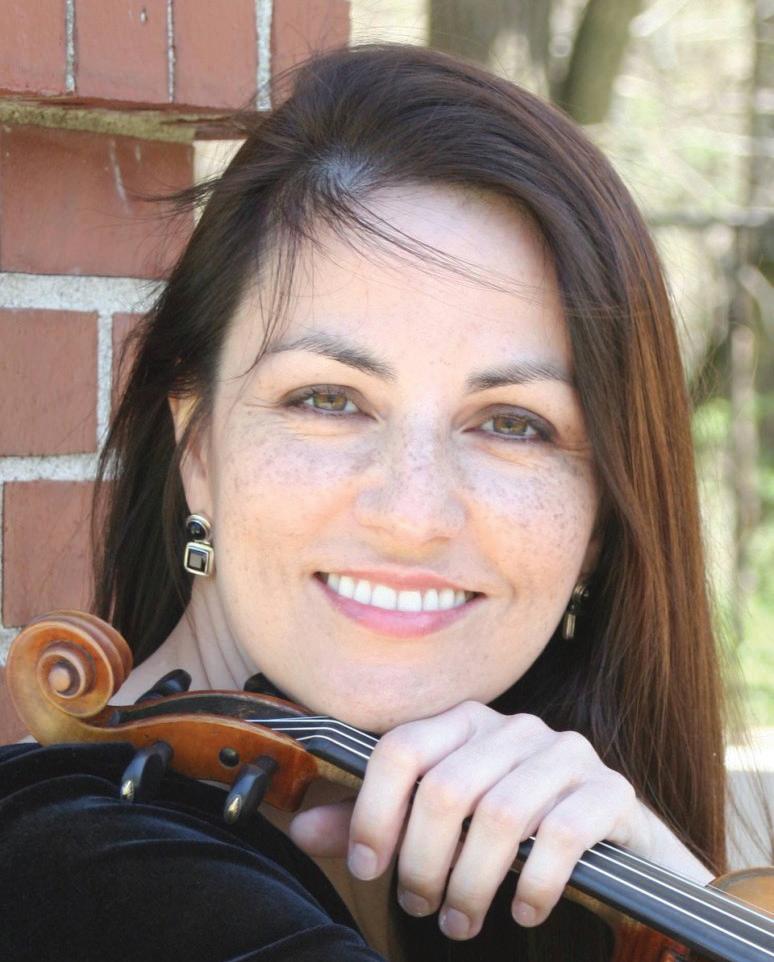
Sometimes it’s one hat and the other hat waits. Sometimes I’m doing both concurrently. And definitely when I’m writing, I’m not thinking about the playing. I used to do that, and I would find that paralyzing because my brain would be stuck in another creative space that didn’t play well with the creation of new music. I learned pretty quickly to just worry about the performance aspect later in the editing phase, and initially, to just try to get what’s in my head out of my head, and then work around with it.
I started as a performer, not with a composing degree, but I was always a music theory geek. I especially liked assignments where we’d have to, for example, write our own cadenzas in the style of Mozart. And when I was at Juilliard, we had a collective of young musicians arranging and writing pieces for weddings and other gigs. So I was always writing – I’ve been writing music since I was a little girl – but never thought about sharing any of my original things until my colleague Charles Wetherbee in my quartet [and former concertmaster of the Columbus Symphony] found out that I could arrange and write – and he essentially outed me to the rest of the world that I was creating music!
I find it important. As a performer, I want to get to a composer’s vision as fast as I can. Sometimes there are technical hurdles for a composer writing for an instrument they are less familiar with, and it can be difficult to realize their compositional voice if what they wrote doesn’t necessarily fit the instrument. That being said, I feel that as a performer it is still our job to try and realize that.
As a composer, I don’t want people feeling like I am trying to make things awkward. I want their musical voice to speak my music – I don’t want it to be smushed into something that doesn’t fit. I really feel like if I can write for the voice that I’ve been assigned to write for, it’s going to be a more satisfying experience for everybody because they won’t have to spend a long time trying to figure out how to make it work. I don’t think having both sides is necessary, but it really helps, and it’s important for composers and performers to be in dialogue.
I go through a phase where I’m collecting ideas, making a lot of sketches, and taking a lot of notes. And I end up with a little creative pile of stuff, sometimes in my head, sometimes literally a pile of stuff that I’m inspired by that I think I might use. And then there’s a point after the collecting phase that I’ll start to work on the pile of stuff and see which one is starting to gain traction musically for me. And once that starts to happen, that’s where I dive in, and I can’t really focus on anything else – I become totally immersed.
When I finally can come out of it, it’s like trying to capture a dream when you wake up in the morning. If you have a dream, and you write it down right away, you can remember it. But if you wait too long, it’s gone. And that’s what it feels like. It’s not exactly the same, but I feel like I have to capture the traction. Once I have enough that I know I can recall where the train of thought is going, I can start working on other things, but until that point, I’m in a tunnel with it.
When you’re sitting down to write music, from where do you draw inspiration?
There’s a lot of things – it can be a visual, or a news story, or something that’s happening in my own personal life, or something that I see unfolding in front of me. A while ago, the quartet was on tour in Japan, and I came across a secret shrine hidden in a courtyard that was totally forgotten about, and that pulled at me musically. I get a lot of ideas when I’m driving, so I’ll stop and record myself singing a melody, or a rhythm, or some other idea to come back to.
I remember waiting to board a flight and seeing a woman saying goodbye to her military husband. She was crying, and he was crying – and it was a powerful thing. If you’ve taken that leap of faith that your family members are going off to serve their country, and you know that you might not see them again – that was a powerful emotion. I’ll just try to collect things like that. And some of them turn into music, and some of them turn into nothing. Sometimes they start out as one thing, and it’s actually just a springboard to the next thing, so they get used as a tool to get me to the next place.
Can you dive a little deeper into how you go about translating visuals, events, or anything else you observe into musical terms?
Sometimes it’s the rhythm of words. There’s a piece that I wrote that was based on a bird call. Here in the Pacific Northwest, there’s a bird called the Swainson’s thrush. Having lived in Ohio, I had never heard it before. I recorded their call, transcribed it, and then I turned it into music and surrounded it with other things. Sometimes, it’s based on a human sensation – there’s a piece I wrote based on fear and courage, and I wanted to capture a human reaction to those emotions in music. Another work was inspired by the Arab Spring. I saw the video of a man setting himself on fire in Tunisia and it just floored me. I was writing at the time and thinking about what would drive a person to such a point.
It’s a strange alchemy about how you make that kind of emotional impact turn into music. Sometimes I just write a whole bunch of words down. And in some cases, the words have a rhythm, they have an inflection, and they turn into a melody. Formally, my compositional process is a little chaotic, but I recognize that when I feel like my brain is catching on to something, I just go with it – and then I mold it like clay.
How would you characterize your musical language and style?
Some of it is unapologetically tonal. And some of it is very light-hearted. But some of it is very dark and not always tonal – it sort of defies easy classification. But I don’t make a purposefully thorny academic thing. I don’t feel like you have to have a degree in music to understand my music. I feel like you just need to be a human. Maybe you like it, maybe you don’t – but I don’t try to make it complicated, I just try to write something that speaks to me as a human and feels honest and authentic.
For audience members who would like to listen to some of your music beforehand, what works would you point them to?
Fiddle Suite: Montana is the work of mine that has gotten the most plays and sold the most CDs – my quartet played it at Chamber Music Columbus in 2010. It’s very approachable and people like it, but it is not by any means representative of my body of work. I’m really proud of the opera The Flood that I wrote for Opera Columbus, based upon the Franklinton Flood of 1913. I’m really proud of the ballet Claudel I did for Columbus Dance Theatre. The Six Tasty Caprices for solo violin show some different personalities. EntangledBanks was a commission from the Ohio State Department of Entomology commemorating Darwin’s 200th birthday and the 150th anniversary of the publication of On the OriginofSpecies. I’d also highlight my violin concerto TheStoryteller, based on Japanese folktales which notoriously malign women so I gave the second movement a feminist bent.
A number of your works are based upon a particular geographical location. As you gather your thoughts for your Chamber Music Columbus commission, are you considering giving it a Columbus connection?
I’d like to tie it to Columbus, but I also don’t want it to be only rooted in one place. But I feel like I grew into my adulthood in Columbus: I moved there fresh out of college and stayed 18 years, and played in the Columbus Symphony. And so, of course, I feel that it’s likely to be informed by my time in Columbus. What I’m feeling emotionally will definitely feed into the work – the only guarantee we have is impermanence, and that’s what’s inspiring me.
I love writing music. I’m really glad that my buddy Charles Wetherbee outed me because I don’t know if I would have ever shared it with anybody otherwise. And now it’s one of my favorite things to do. It’s one of my favorite ways to express myself as a human.
Fiddle Suite: Montana
The Flood
Claudel
SixTastyCaprices
EntangledBanks
TheStoryteller
InterviewbySamJacobson
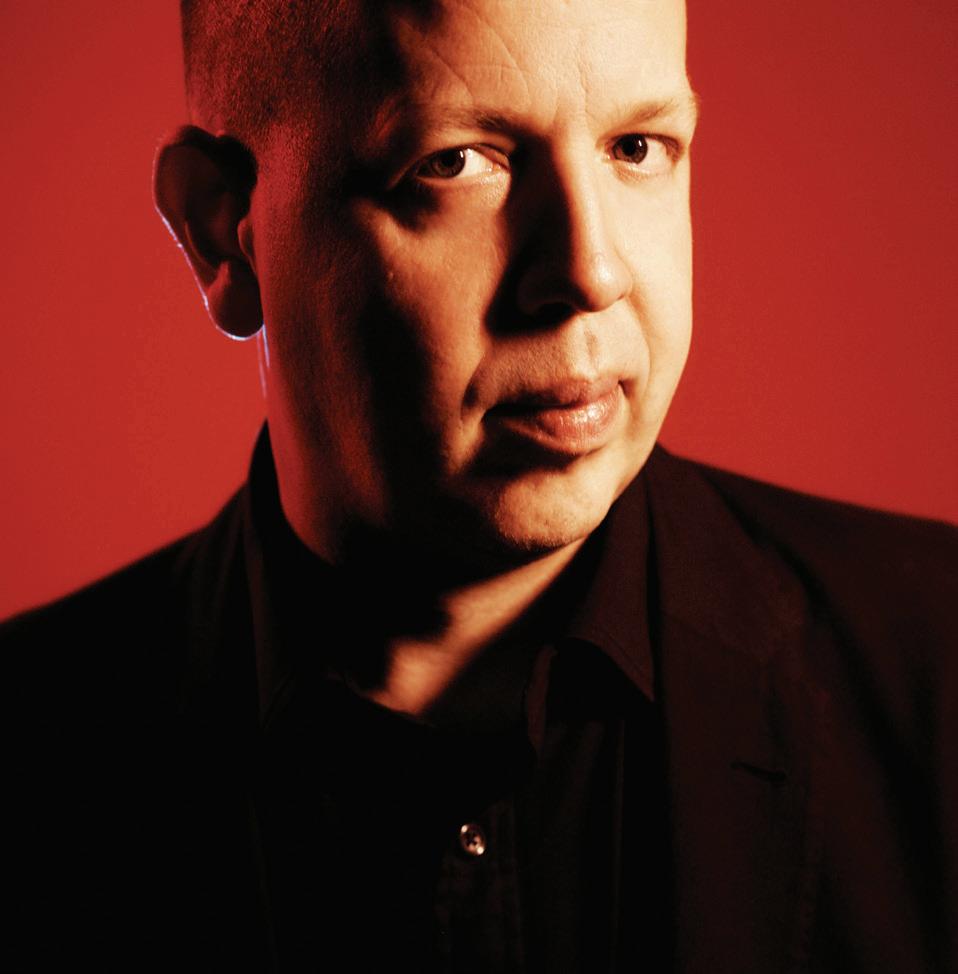
Sat. Apr 1, 2023 - 7PM
You’re distinguished as both a composer and a pianist. How do the two pursuits inform each other?
To be honest, I couldn’t imagine doing one without the other. Both sides of my career inform each other – I think I’d be a very different composer if I wasn’t somebody who was able to experience performing firsthand, and performing my own music firsthand. It’s that famous old triangle of performer, composer, and listener. And I think it really helps if you want to be composer to be able to experience all three corners of that triangle.
I like the solitude of composing, I like spending hours and weeks alone in my room. But after a while, I couldn’t just do that my whole life. I find I have to have the stimulation of other musicians, not just for the social aspect of it, but for the creative aspect as well. As a performer, I’m more of a chamber music pianist than a solo pianist – I really love the response you get back from other musicians.
For me, composing comes out of sitting at the piano and sometimes getting bored of pieces that I’m playing by other composers. So I find myself wanting to improvise a little bit, to do something of my own, and very often pieces that I’m learning will spark off connections in my mind, and I want to explore those. When you think back into the history of classical music, composers always played, usually the piano or a stringed instrument – it was quite an unusual thing for them not to play. I wouldn’t want to say that it’s impossible to compose without a performer’s insight, but for me, it’s essential.
On that note, there’s a long tradition of composer-pianists which seems to be getting reinvigorated lately with artists such as Stephen Hough or Marc-André Hamelin, among others. Is that a tradition you are consciously embracing?
It’s certainly an ongoing tradition. There’s also Thomas Adès or Jörg Widmann, who’s a magnificent clarinetist – and Mark Simpson who’s also a clarinetist and wonderful composer. And conductor-composers too, from Pierre Boulez to Oliver Knussen. Perhaps it’s kind of a control freak thing, particularly when your piece is being done for the first time – you want to be responsible for how it comes over, and the best way to do that, I suppose, is to play it yourself. Certainly when I started out, I was quite nervous about handing my music over to other pianists in particular. It’s quite hard to communicate to other pianists exactly what you want, but that’s something you learn over the years.
All sorts of things. Mostly, I think about the instruments and the players – if I know the players well, I think about them and their characteristics. Occasionally, it’ll be something personal in my life, or something to do with the environment, but those are quite private things that I don’t like to share. When I think about a string quartet, for instance, I sort of visualize it and get a sound picture in my mind, which is my starting point. But the actual process of composing a piece starts off rather fun. You have a few days where you’re just brainstorming and writing down lots of little motifs, tiny fragments of ideas. But then you have to sift through them to find something – and it might take six months, or even a couple of years to write a piece, depending on how long it is. That’s the hard part until you really get into the piece. So the inspiration doesn’t just fall out of the sky – I sort of get it from the piano, just immersing myself in sounds and harmonies.
Any composers or teachers you would highlight as influences?
When I really started composing, Benjamin Britten’s music spoke very strongly to me. It was something about his harmonic language, a very fresh way of writing tonal music, which really appealed to me. And I still love his music. I had a wonderful teacher called Julian Anderson at the Royal College of Music in London. I think there was a feeling when I was at conservatoire that if you wanted to be taken seriously as a composer, you had to write music that was rather austere, rigorous, and perhaps inaccessible, and Julian encouraged me to be a bit more honest about the sort of music I wanted to write. That was an inspiration, also a kind of liberation, really just feeling free and confident in my own ideas.
There are also countless performers that I’ve been lucky enough to work with over the years. Perhaps performers have been even more of an inspiration than other composers. My brother, Paul, is a cellist – currently in the Emerson String Quartet – and he’s somebody who’s
been a huge influence and inspiration to me since I was born, really. And he was the one who introduced me to the Calidore Quartet, and spoke very highly of them – they will be giving the first performance of my quartet at Wigmore Hall in May 2022.
When you’re writing a piece with specific performers in mind, how much communication and back and forth do you typically have with them?
It can vary, the process of working with a group is different every time. If I’m writing for an instrument that I have less familiarity with, there’s a lot of back and forth because there’s always the danger that you’ll write something that doesn’t work. With a string quartet, I understand reasonably well how the instruments work, but I’m not a string player – so there will always be little things.
But great performers don’t like to bother you too much. They’re used to playing music of composers who are no longer with us and unable to answer questions, so they have to find solutions without that – but I hope they will be in touch if there’s things that aren’t clear. Most of my input comes the first time I hear them play it. However much I played through it myself, it’s hard to know exactly how it’s going to work until you hear a real string quartet playing it.
The difficult thing is just that the repertoire for string quartet is so vast, so full of these towering masterpieces, that it is a bit daunting. As a pianist, I always feel slightly more at home writing chamber music with a piano. The piano can be a comfortable way of binding the ensemble together. It’s such a familiar instrument, and such a hub, that writing for strings without piano can be a bit more of a technical challenge.
I think it’s something to do with the way pianist-composers think about harmony. And there’s a way you can sustain things with a pedal that you can’t do in quite the same way in the string quartet, so you have to think of ways of translating those musical ideas to those four instruments – which is a really fun challenge. I suppose one also must be careful to have enough variety of sound as the strings are sort of homogenous in sound, and I have to think how to break out of that from time to time. Once I get into writing a string quartet, I love it, there’s something very satisfying and very pure about the medium.
I wouldn’t describe it as classically tonal music, but I want to write in a kind of language that feels familiar and understandable, but on the other hand, fresh and slightly unexpected. It’s no longer my desire to write something completely unlike anything else, completely original. I don’t think that’s really possible. I quite like historical models from 200 years ago, or 20 years ago – it’s very interesting to me to find what I can do in familiar forms. I also love very fast, exciting music, so there’s a lot of that in the quartets. And I want to write beautiful harmony as well. It’s not for me to say whether it is or not, but it’s my aim to write something that really just gives pleasure to perform and to listen to.
For listeners wanting to get more acquainted with your work, which pieces would you point them to?
I wrote a piano quintet on a commission from the Chamber Music Society of Lincoln Center a few years ago, and that’s a piece in a quite similar language as the quartet I’m writing for Calidore. There are also a couple of orchestral pieces I would suggest: there’s a disc that includes my Symphony No. 1 and Flute Concerto which gives a sense of the structure and arc I like to develop.
And in fact, I have been to Columbus before to play with ProMusica and David Danzmayr in 2015 as part of their Composer/Performer Project. I played a Shostakovich piano concerto with them, and they did a string orchestra piece of mine, Little Symphony – and in 2013, they performed my Three Welsh Songs. They were lovely and brilliant, and it was a very nice and cultured audience. I really enjoyed being Columbus, and I’m just thrilled that Columbus has come on board with a commission and getting the first US performance of the quartet. It’s a real honor for me.
Piano Quintet
Symphony No. 1
Flute Concerto
Little Symphony
Three Welsh Songs
InterviewbySamJacobson
Sat. May 6, 2023 - 7PM
At what point did you realize music composition was something that you were drawn to?
Fairly early, probably in high school. I had a traditional musical training, but I enjoyed not only playing music, but it also intrigued me how pieces were put together. And I remember that I wasn’t quite as interested in practicing things to perfection, but figuring out how they worked and why they sounded the way they did. And that led to me writing various pieces, usually things that were based on pieces that I was learning. So if I was learning a Joplin rag, for example, I would figure out what made it tick, and I would write something that would sort of emulate that.
When you sit down to write a new piece, where do you generally draw inspiration from?

It’s quite variable. A lot of my pieces are influenced by extramusical elements – things like text if it’s a vocal piece, or artwork, or dance, or visual arts of various kinds, or film. But sometimes they’re purely musical and stem from a particular musical idea that I may have, or particular performers that I might be writing for who play a certain repertoire play a certain way. So it depends on the piece, but of a lot of my pieces take an extramusical or cross-disciplinary influence in terms of how they come into being and how they gestate in my head.
How do you go about capturing an extramusical influence in a composition?
With a visual work of art, it’s obviously not something that’s direct. It could be a technical thing, or it could be a stylistic thing particularly if it’s an abstract work of art. I could be trying to find a musical analogue to some abstract process that’s happening within the artwork having to do with foregrounding and backgrounding or collage or something like that. If it’s a more representational work, it might be more to do with the narrative structure of a piece or imagining a story of some kind, or perhaps, certain naturalistic elements that are in the artwork. Oftentimes that’s where I begin, and where I take a little bit of a thread. The piece may not necessarily end up sounding like the artwork – it could end up pretty far away from it. So maybe it’s more something that’s a personal starting point, as opposed to something that I’m expecting or hoping that audiences will make a connection to.
How would you describe your musical style and language?
That’s the question composers always dread answering! It’s tonal to an extent, and I like to think it’s lyrical in some aspects. One thing I might say is that it’s quite eclectic. It often draws from a lot of different sources, not only extramusical, but even within the musical means. Sometimes I’ll bring in elements from jazz or music of other cultures, other parts of the world. Or references to current events. But it’s hard to be more specific than that since it varies quite a bit from piece to piece.
Are there other composers or teachers you studied with that you would point to as influences?
I tend to draw on things from a lot of different places. Any of the major figures of the twentieth century certainly are important to me, and elements of what I do certainly derive in one way or another from the biggies like Stravinsky, Bartók, and Messiaen. The composers that I listen to rotate – I’ll get really into a certain composer for a period of time, and listen to a lot of their music, and then I’ll get interested in another composer. It rotates depending on what I’m working on, or what sort of things I’m obsessed with musically. I’ll sometimes use other composers almost like research when I’m writing a piece.
Is there anything in particular you want an audience to know if they’re hearing one of your works for the first time?
I try to write music in a way that if one didn’t know the details of the piece, its influence, or if there’s a particular programmatic aspect to it, it wouldn’t necessarily matter. But sometimes it is nice when an audience will know that going in, so I don’t shy away from letting an audience know through a title, program notes, or even a visual image.
For those who want to explore some of your music before the Chamber Music Columbus concert, which pieces would you suggest?
The easiest things to get into might be some of my chamber music. I have a trio called Six Bagatelles, which is a pretty representative piece. There are a couple vocal pieces as well, and I have a piece I wrote recently for orchestra and bass voice soloist called The Prisoner, which is a little bit heavier of a work. That’s a good representation of what I do.
What’s your objective or goal for a new work?
I think of it as a kind of a kind of communication. It’s a way for me to connect with an audience in a non-verbal way. Part of that is an emotional connection, having the audience experience the piece in a visceral way that draws them in, and the music elicits certain kinds of feelings or takes them on a journey of some sort. That’s the goal in terms of getting through to the audience, and my job is figuring out how to accomplish that. It’s my task to make the music true to myself as an artist in terms of my language, the way I hear the world, and the way I hear music in my head.
But at the same time, I need to communicate in such a way that it’s translatable so other people can understand it – not only me – and that other people might be able to get on the wavelength that I’m on, in some sense, and have an emotional and intellectual journey in hearing the piece presented to them.
I know the piece you’ve been commissioned to write for Chamber Music Columbus is a piano trio. What are your general impressions of writing for that medium – what’s attractive about it, and what are some of the challenges?
Piano trio is a really interesting combination to write for – I have one other piece for piano trio, and it was a lot of fun to write. All the instruments are very agile they have lots of capabilities when it comes to ways of playing and range and color. I think what makes it challenging, at least for me, is the balance, because piano can be a very large presence, both sonically and coloristically. Being able to balance between the piano and the strings, which are obviously a bit more homogenous to one another, is necessary so it doesn’t end up sounding essentially like a piano concerto. But it’s fun challenge, and that’s part of what I like about it because I often approach pieces in a problem-solving manner.
As a professor at the Shepherd School of Music at Rice University, what is your approach to teaching composition? And how do you strike a balance between offering guidance while also giving students the latitude to develop their individual voices? I balance my approach against what the students are coming in with. Unlike someone studying violin, for instance, composers will often come in with lots of different levels of experience. Part of my approach is to figure out where a student is and meet them there, see what they’ve done, what they haven’t done, what they may be strong in and what they’re less strong in, and guide them in terms of free composition into those areas where I think they might need work.
When you’re writing music, you’re very much putting your heart on your sleeve, so it’s a cherished relationship between a student and a teacher. Students come in to lessons with a desire to improve: they bring in their work and we decide collectively what to work on rather than me coming in and dictating what they should be doing.
You’re a founding member of the ensemble Musiqa. Can you tell us more about them and some of the projects you’ve done with them?
When I first got to Houston, there was a little bit of new music here, but not a lot. And my colleagues and I, specifically Anthony Brandt, who’s also on faculty here, and some faculty from University of Houston, decided to put together a new music presenting group. It started small, we did one concert per year in the Rothko Chapel – a building which has a long relationship with music. The season has grown quite a bit since, and we have a very extensive educational program serving 5000 students a year who come downtown for a concert that we compose for them.
The group continues with theme of extramusical connections – one of the things that we pride ourselves on is that all of our concerts have some extramusical dimension to them. Our last concert was a collaboration with NobleMotion Dance. In one piece, all of the dancers wore EEG caps, recording data from their brain activity which was fed into a mixing mechanism. And for that part, we collaborated with scientists from the Houston Medical Center. Houston is a big art town, especially for the visual arts, and we’ve really enjoyed collaborating with different groups to bring the arts together.
The Prisoner
Six
InterviewbySamJacobson
The Ohio State University College of Arts and Sciences has commissioned Jaehyuck Choi to compose a work honoring James Cain - our founder and Ohio State University graduate. That work, Clarinet Quintet will be premiered as part of a joint Chamber Music Columbus and VIVO Labor Day Weekend concert on Sunday, September 4 at 2:00 p.m.
Born in Seoul on October 31, 1994; Jaehyuck Choi is a composer, conductor, and Artistic Director of the ensemble blank. After winning the 1st prize of the Concours de Geneve in 2017, his works have been commissioned and premiered by the ensembles and orchestras such as Ensemble Intercontemporain, Parker Quartet, L’Orchestre de Chambre de Geneve, Seoul Philharmonic, Daejeon Philharmonic, Gyeonggi Philharmonic, The Juilliard Orchestra, FontanaMix Ensemble, Divertimento Ensemble, and so on.
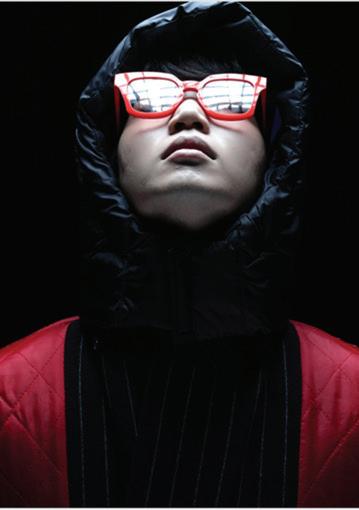
Choi was appointed as invited guest and commissioned composer by the world-renowned Menuhin International Violin Competition (2018), and at the Banff Centre for the Arts (2021). In 2022, The House Concert in Korea holds his portrait concert, and in 2024, the Ensemble SORI will also have portrait concert of his music.
Lover of paintings and sculptures, Choi founded the ensemble blank in 2015, which has become one of the Korea’s leading contemporary music groups. The ensemble blank continues to perform under the direction of Choi. He makes his home in Berlin and in Seoul.
In 2018, Choi made his international debut as a conductor on Stockhausen’s Gruppen at the Lucerne Festival with Sir Simon Rattle and Duncan Ward conducting the London Symphony Orchestra and the Orchestra of the Lucerne Festival Academy.
Jaehyuck Choi holds a bachelor of music and master of music degrees in composition from The Juilliard School, and is continuing his composition studies at the Barenboim-Said Akademie.
“much sense of expressivity, color, movement, motion, and a beautiful way of how to display energy” - Matthias PintscherPhoto: Estro Studio
From commissioning original works to presenting outstanding ensembles to engaging budding young musicians through our scholarships, your continuing passion and support are vital. Please consider Chamber Music Columbus in your planned giving and by donating to our 2022-2023 season Annual Fund.
The James N. Cain Legacy Society is named for our founder. The Society offers a non-binding donation agreement and is administered by the Columbus Foundation for the enduring financial benefit of Chamber Music Columbus. The Society welcomes single or recurring
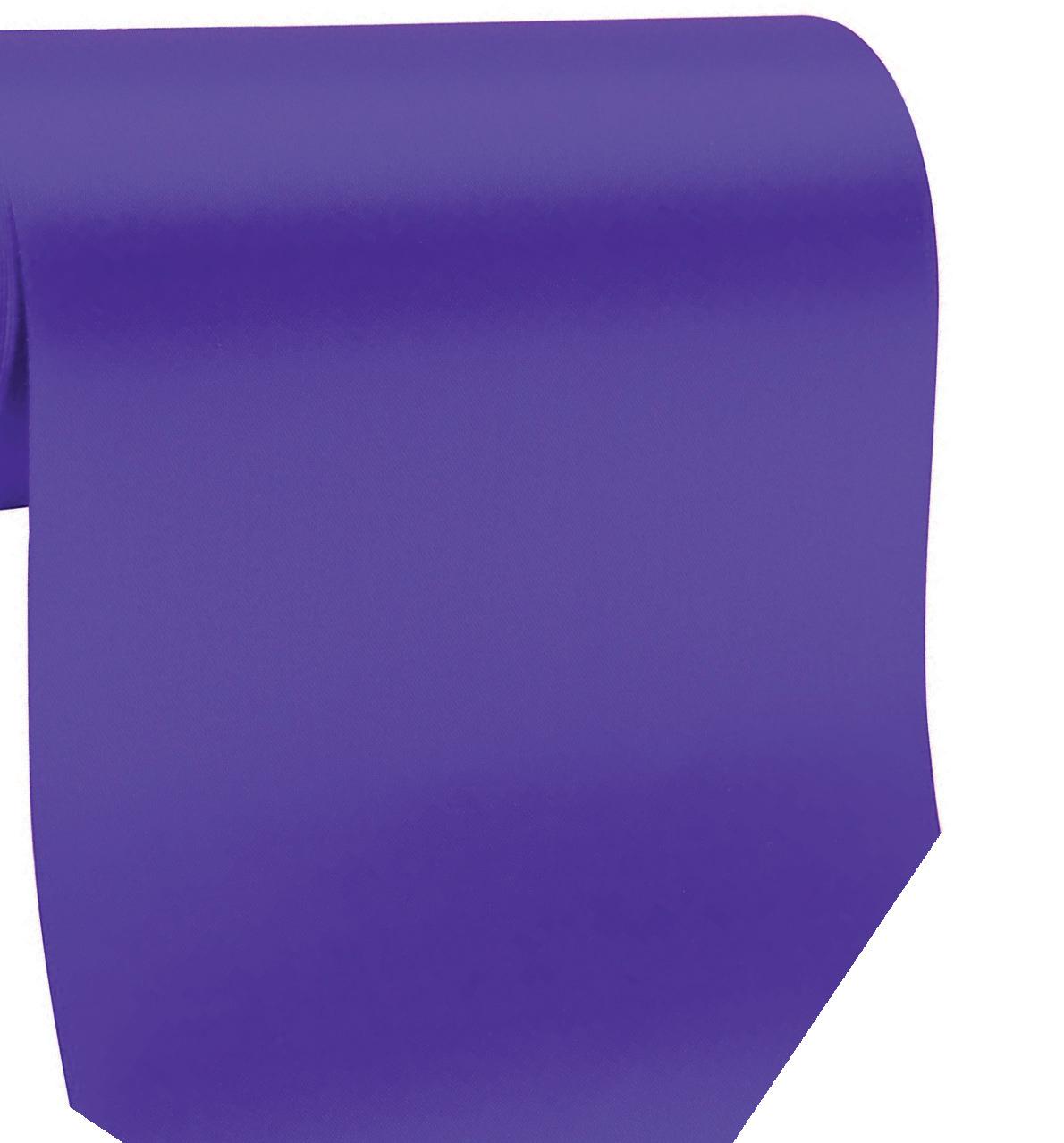
Chamber Music Columbus embarks on its historic 75th season we hope that you will be inspired by the cultural and artistic milestone that you have made possible.
